Almost every day over the past month, ISIS affiliates around sub-Saharan Africa have used their vast social media presence to report on their ongoing persecution campaign against Christians – a campaign like they conducted in Iraq, Syria, and Libya. And, as happened during the time of the Caliphate under ISIS, the Christian world is sitting by and doing nothing.
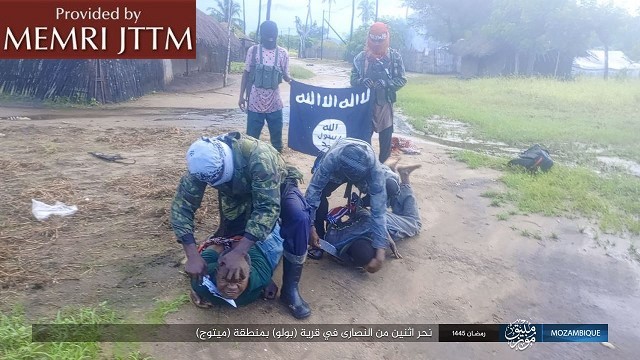
ISIS fighters behead two Christians in Mozambique, March 17, 2024
In the summer of 2023, the MEMRI JTTM Project released a seminal study titled "ISIS In Africa (Chad, Cameroon, Niger, Democratic Republic of the Congo, Nigeria, Mozambique): Targeting Christians – Killing, Beheading, Murdering Priests And Nuns, Burning Churches, Health Clinics, And Homes – As The World Is Largely Silent." The report detailed how ISIS's branches in Africa – Islamic State Central African Province (ISCAP), Islamic State West Africa Province (ISWAP), and Islamic State-Mozambique (ISMP) – have been attacking and terrorizing Christians across the continent, killing civilians, destroying churches, kidnapping Christians for ransom, forcing conversions, taking slaves, and destroying symbols and signs of Christianity. As noted, these groups are thoroughly documenting their attacks, publishing detailed descriptions, photos, and videos on their media outlets and social media accounts.
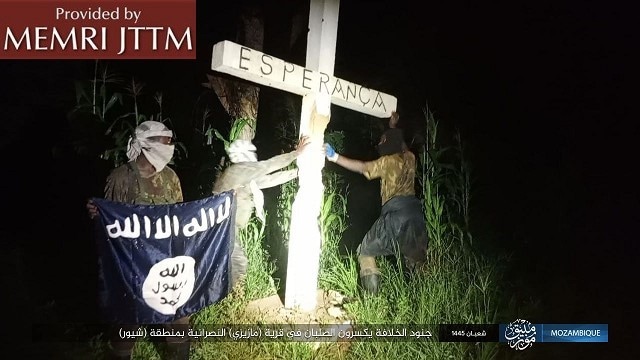
ISIS fighters topple a cross in Mozambique in February 2024. The cross bears the Portuguese word "hope."

Burning churches in Borno state, Nigeria, December 30, 2021, and in Cabo Delgado, Mozambique, June 20, 2022.
At the time of publication, this report was shared with international bodies and legislatures, as well as religious leaders and media outlets. Yet to date there has been little to no response or action to help the Christians being targeted, and thousands more have been killed since.
A typical day for Christians in Africa who are visited by ISIS includes being forced to pay the jizyah poll tax imposed on non-Muslims living under Islamic rule, choosing between conversion to Islam or death, having their churches destroyed and their villages burned to the ground, and seeing their religious leaders beheaded or otherwise murdered. While most of the attacks are by ISIS, others are by Al-Qaeda and its African supporters. Islamist Fulani militias are also involved in targeting Christians.
These groups' documentation and dissemination of their attacks is aimed at inspiring horror and boosting their fearsome reputation. For example, on July 11, 2024, ISIS featured, in Issue 451 of its weekly Al-Naba' newsletter, an infographic detailing its major operations in the previous Hijri calendar year, July 19, 2023-July 7, 2024. Earlier, on July 1, A'maq News Agency, the ISIS media arm, released a poster tallying ISIS attacks worldwide in the first half of 2024. Both these publications featured sections celebrating the killing during those periods of nearly 2,000 [1920] Christians and burning of 30 churches in Mozambique and Democratic Republic of the Congo (DRC).
Since December 2, Islamic State Central Africa Province (ISCAP) has claimed responsibility for dozens of attacks in DRC's North Kivu and Ituri provinces, as well as in Mozambique, where they killed well over 40 Christians in just two weeks. On December 17 in Ituri Province, ISCAP fighters attacked Nigleza village with machine guns, killing "several Christian nonbelievers" and burning down five homes. On December 22, in an attack on the village of Kojo, in Lubero Territory, they beheaded 19 Christians before torching 30 homes, and the very next day they fell upon the Christian village of Robinte, where they beheaded six villagers and took four hostage. The total Christian death toll in December so far exceeds 70, with 30 beheaded.
Forcible Conversion To Islam
Sometimes, Christians are offered the option of conversion. On August 8, 2024, the pro-ISIS Hadm Al-Aswar Foundation released a poster on its Telegram channel titled "The Only Solution for Christians," showing an ISIS operative removing a cross from a church roof, a hand with an index finger raised in a gesture used by ISIS to indicate Islamic monotheism, and a hand appearing to be paying the jizyah – a tax placed on non-Muslims living under Islamic rule. The poster included text from an editorial titled "Jihad in the Congo" from Al-Naba' Issue 448, in which ISIS issued an ultimatum: Christians can "either convert to Islam, or pay jizyah, otherwise [ISIS] will continue to execute them, burn their homes and businesses, and plunder their properties." It concluded: "The path is clearly defined with its means and goals, and the soldiers of the Islamic State cannot deviate from it."
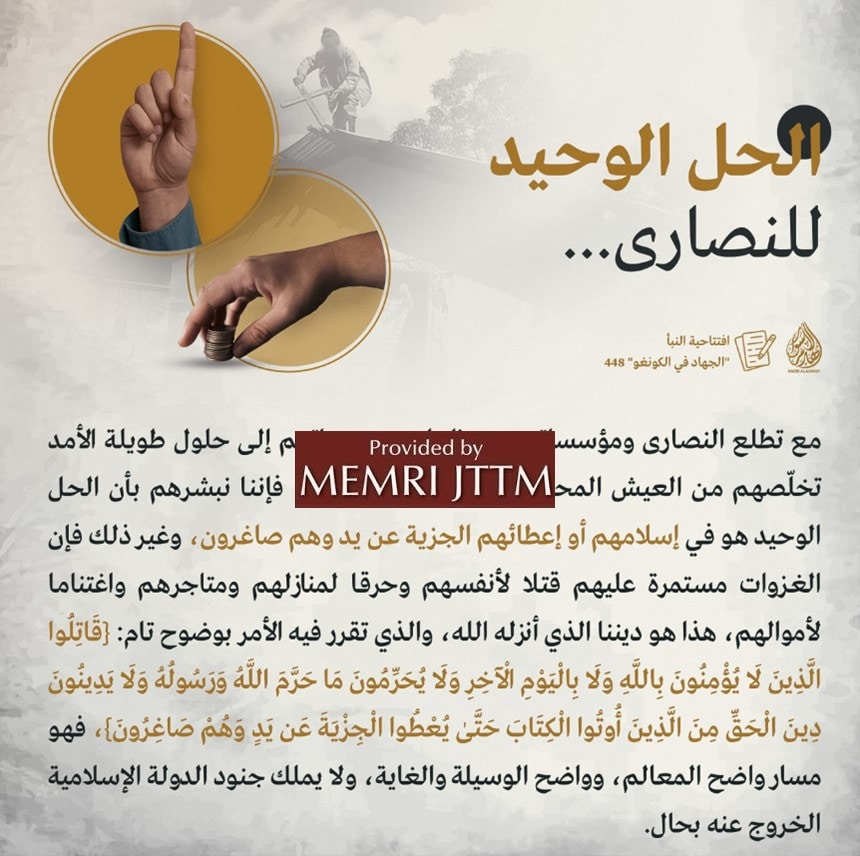
Faced with such choices, some African Christians convert. Al-Naba's Issue 462, published September 26, 2024, featured an "exclusive" report stating that dozens of Christian villagers in Ituri Province, DRC had done so after being taken prisoner. The report also tallied the operations by Islamic State Central Africa Province (ISCAP) for the week of September 18-24 against Christians in various villages; several were shot to death but most were captured and beheaded once they were discovered to be Christian. An "exclusive source" told the magazine that dozens of Christians captured in operations across the province had converted as a result of ISCAP's preaching, thus "preserving" their lives. The mujahideen, said the source, had taught the prisoners Islam and a set of obligations and teachings, and then released them, after they were entrusted with a message to other Christian villagers to convert "in order to safeguard their blood and property" and that "the Caliphate soldiers are keener on guiding people [to Islam] than on killing them."
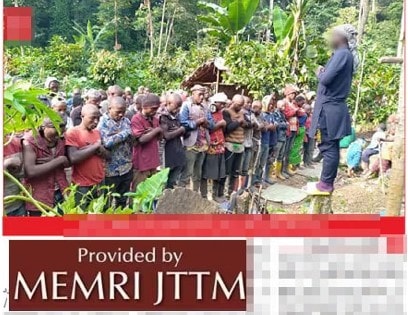
Photo from the report in Al-Naba Issue 462 showing mujahideen leading the formerly Christian captives in prayer.
The abovementioned "Jihad in the Congo" editorial in the Al-Naba' Issue 228, released June 21, 2024, also focused on conversion: In addition to praising for ISIS "military operations" targeting and killing Christians in eastern DRC, it included an ultimatum for the local residents: "Either convert to Islam, give jizyah, or die."
The piece opened by accusing Western media of a media blackout on ISIS's escalating operations in DRC due to "racial discrimination" and "white supremacy," claiming that the Western media only care about news concerning Christians in the West. At the same time, it called this lack of media coverage an "attempt to cover up the escalating frequency of the African jihad under the banner of Caliphate, and to cover up the failure of major state powers in facing it." It went on to mock local militias, the Ugandan army, and UN forces for their failure to protect Christians and to stop ISIS activity: "The recent operations, in which the blood of dozens of Christians was shed, and in which many fled, leaving behind their money to be seized as spoils or to be ruined by fires set by the mujahideen, are only the beginning for the failing new campaign [against ISIS]."
It is ISIS that will save them, said the editorial, addressing Christians in the DRC and inviting them to convert so as to remain alive, or to pay the jizyah: "To the Christians, their institutions, and their community organizations searching for long-term solutions that will rid them of a life surrounded by death in every direction[:] We give them the good news that the only solution is for them is to convert to Islam, or to pay the jizyah and remain submissive. Otherwise, the invasions will continue against them, as will the killings, the burning of their homes and shops, and the seizure of their money."
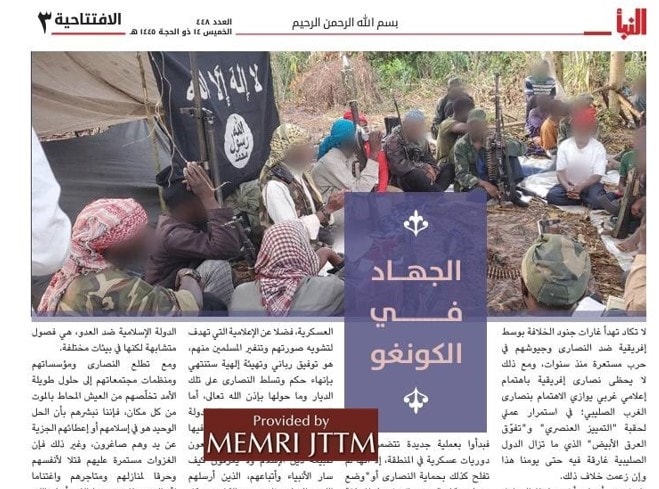
The "Jihad in the Congo" Al-Naba' editorial
Burning Down Christian Villages
Something else that could happen to a Christian in the DRC is having their village burned down by ISIS. ISCAP published a set of photos on August 2, 2024 documenting an attack by its fighters on the "Christian village" of Bandulu, in North Kivu province. In the photos, the fighters walk through the village torching homes; also shown are a dead body and burned heavy equipment identified as belonging to a "Christian company." ISCAP issued several claims of responsibility for attacks in the village and its vicinity around July 27, and added that it had beheaded 15 civilians as well.
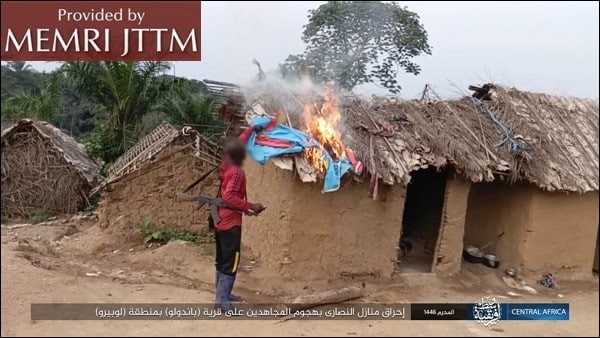
Beheading Christians
During its Caliphate heyday in Iraq and Syria, ISIS reveled in horrifying the world with its beheadings, including of Western journalists decapitated live on camera. While no such videos from Africa have been released, beheadings are documented in numerous photos.
In addition to the photos, ISCAP often claims to have carried out many more beheadings. In four statements on July 25 through 27, 2024, ISCAP said that it had attacked six villages in northeast DRC and beheaded nearly 60 Christians in them. In two attacks alone, it beheaded a total of 54 villagers; in the largest, in the village of Beu-Manyama in the Beni territory of North Kivu province, it had reported over 30 decapitations.

The second largest attack, also in North Kivu province targeted three villages – Nzakiya, Moya, and Mangumbo and 24 Christian villagers were beheaded, and in a third attack, in Ombole village in neighboring Lubero territory, another Christian was captured and beheaded.

In another particularly deadly attack in Beni territory on June 7, ISCAP said it had beheaded over 60 Christians. In other encounters, it captured and beheaded two Christians in Ndalia village in Ituri province.
No One Is Coming To Help African Christians – And Jihadis Feel Free To Terrorize And Murder
Not a day goes by without the MEMRI JTTM team documenting jihadi reports of attacks on African Christians. Sadly, this terrorizing and slaughter of Christians outside the West has gone almost unnoticed, with no real action even by those who have the power to speak out and help protect them. These include the UN, the African Union, the South African military, the Vatican and Pope Francis himself, even organizations such as Amnesty International and Human Rights Watch, or the NAACP. And not one word has been heard from Black Lives Matter, the Squad in Congress, scholars like Ta-Nehisi Coates, and many other imposters who say they care about human rights – but only do so selectively.
* Steven Stalinsky, Ph.D is Executive Director of MEMRI.





